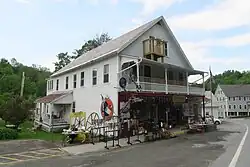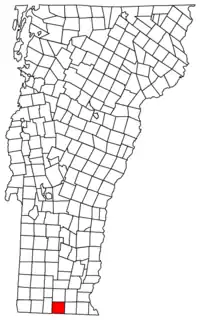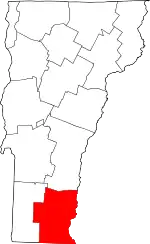Whitingham, Vermont | |
|---|---|
 Birthplace of Brigham Young, who is the 1st Governor of Utah Territory and the 2nd president of the Church of Jesus Christ of Latter-day Saints | |
 Whitingham, Vermont | |
 Whitingham, Vermont Location in the United States | |
| Coordinates: 42°47′N 72°51′W / 42.783°N 72.850°W | |
| Country | United States |
| State | Vermont |
| County | Windham |
| Area | |
| • Total | 39.3 sq mi (101.8 km2) |
| • Land | 37.1 sq mi (96.0 km2) |
| • Water | 2.2 sq mi (5.8 km2) |
| Elevation | 1,916 ft (584 m) |
| Population (2020) | |
| • Total | 1,344 |
| • Density | 36/sq mi (14.0/km2) |
| Time zone | UTC-5 (Eastern (EST)) |
| • Summer (DST) | UTC-4 (EDT) |
| ZIP code | 05361 |
| Area code | 802 |
| FIPS code | 50-83950[1] |
| GNIS feature ID | 1462261[2] |
Whitingham is a town in Windham County, Vermont, United States. The town was named for Nathan Whiting, a landholder.[3] The population was 1,344 at the 2020 census.[4] Whitingham is the birthplace of Brigham Young, the second president of the Church of Jesus Christ of Latter-day Saints (LDS Church) and founder of Salt Lake City, Utah. Its village center, census-designated place, is also listed on the National Register of Historic Places as the Whitingham Village Historic District.
Geography
According to the United States Census Bureau, the town has a total area of 39.3 square miles (101.8 km2) of which 37.1 square miles (96.0 km2) is land and 2.2 square miles (5.8 km2) (5.70%) is water.
Demographics
| Census | Pop. | Note | %± |
|---|---|---|---|
| 1790 | 442 | — | |
| 1800 | 868 | 96.4% | |
| 1810 | 1,248 | 43.8% | |
| 1820 | 1,397 | 11.9% | |
| 1830 | 1,477 | 5.7% | |
| 1840 | 1,391 | −5.8% | |
| 1850 | 1,380 | −0.8% | |
| 1860 | 1,372 | −0.6% | |
| 1870 | 1,263 | −7.9% | |
| 1880 | 1,240 | −1.8% | |
| 1890 | 1,191 | −4.0% | |
| 1900 | 1,042 | −12.5% | |
| 1910 | 969 | −7.0% | |
| 1920 | 811 | −16.3% | |
| 1930 | 734 | −9.5% | |
| 1940 | 789 | 7.5% | |
| 1950 | 816 | 3.4% | |
| 1960 | 838 | 2.7% | |
| 1970 | 1,011 | 20.6% | |
| 1980 | 1,043 | 3.2% | |
| 1990 | 1,177 | 12.8% | |
| 2000 | 1,298 | 10.3% | |
| 2010 | 1,357 | 4.5% | |
| 2020 | 1,344 | −1.0% | |
| U.S. Decennial Census[5] | |||
At the 2010 census,[1] there were 1,357 people in the town. The population density was 34.53 per square mile (13.33/km2). There were 918 housing units at an average density of 25.1 per square mile (8.4/km2). The racial makeup of the town was 99.23% White, 0.08% African American, 0.31% Native American, and 0.39% from two or more races. Hispanic or Latino of any race were 0.69% of the population.
There were 515 households, of which 33.2% had children under the age of 18 living with them, 61.2% were married couples living together, 7.6% had a female householder with no husband present, and 27.8% were non-families. 22.1% of all households were made up of individuals, and 8.3% had someone living alone who was 65 years of age or older. The average household size was 2.52 and the average family size was 2.94.
25.3% of the population were under the age of 18, 6.7% from 18 to 24, 28.2% from 25 to 44, 27.3% from 45 to 64, and 12.5% who were 65 years of age or older. The median age was 39 years. For every 100 females, there were 97.9 males. For every 100 females age 18 and over, there were 98.4 males.
The median household income was $37,434, and the median family income was $45,500. Males had a median income of $30,590 versus $25,188 for females. The per capita income for the town was $21,904. About 5.9% of families and 7.9% of the population were below the poverty line, including 11.5% of those under age 18 and 7.4% of those age 65 or over.
Notable people
- Arthur P. Carpenter, US Marshal for Vermont[6]
- Harrie B. Chase, judge of the United States Court of Appeals for the Second Circuit[7]
- Paul A. Chase, Associate Justice of the Vermont Supreme Court[8]
- Henry W. Closson, U.S. Army brigadier general[9]
- Isaac Goodnow, founder of Manhattan, Kansas and Kansas State University[10]
- Karen Hein, pediatrician and founder of the first HIV/AIDS program for adolescents in the world[11]
- Horace B. Smith, former US Congressman[12]
- Brigham Young, early leader of the Church of Jesus Christ of Latter-day Saints[13]
Climate
This climatic region is typified by large seasonal temperature differences, with warm to hot (and often humid) summers and cold (sometimes severely cold) winters. According to the Köppen Climate Classification system, Whitingham has a humid continental climate, abbreviated "Dfb" on climate maps.[14]
References
- 1 2 "U.S. Census website". United States Census Bureau. Retrieved January 31, 2008.
- ↑ "US Board on Geographic Names". United States Geological Survey. October 25, 2007. Retrieved January 31, 2008.
- ↑ "Profile for Whitingham, Vermont". ePodunk. Retrieved May 10, 2010.
- ↑ "Census – Geography Profile: Whitingham town, Windham County, Vermont". Retrieved January 7, 2022.
- ↑ "U.S. Decennial Census". United States Census Bureau. Retrieved May 16, 2015.
- ↑ Carleton, Hiram (1903). Genealogical and Family History of the State of Vermont. Vol. II. New York, NY: Lewis Publishing Company. p. 105 – via Internet Archive.
- ↑ Harrie Brigham Chase at the Biographical Directory of Federal Judges, a publication of the Federal Judicial Center.
- ↑ Ballou, H. B. (Whitingham, VT Town Clerk) (November 13, 1895). "Vermont Vital Records, 1720–1908, Birth Entry for Paul Addison Chase". Ancestry.com. Provo, UT: Ancestry.com, LLC. Retrieved January 15, 2018.
{{cite web}}: CS1 maint: multiple names: authors list (link) - ↑ Cullum, George W. (1879–1920). "Henry W. Closson in Biographical Register of the Officers and Graduates of the U.S. Military Academy at West Point, N.Y." penelope.uchicago.edu. Chicago, IL: Bill Thayer. Retrieved August 2, 2021.
- ↑ "Isaac T. Goodnow, 1814–1894". Territorial Kansas Online. Kansas State Historical Society: Kansas State Historical Society. Retrieved January 7, 2022.
- ↑ "Dr. Karen Hein". Changing the Face of Medicine.
- ↑ Parsons, E. B. (1886). Obituary Record of the Alumni of Williams College. Williamstown, MA: Williams College. p. 94 – via Google Books.
- ↑ Werner, M. R. (1925). Brigham Young. New York, NY: Harcourt, Brace and Company. p. 3 – via Google Books.
- ↑ Climate Summary for Whitingham, Vermont
External links
- Town of Whitingham, Vermont
- Burrington Hill – defunct ski area in Whitingham Vermont
